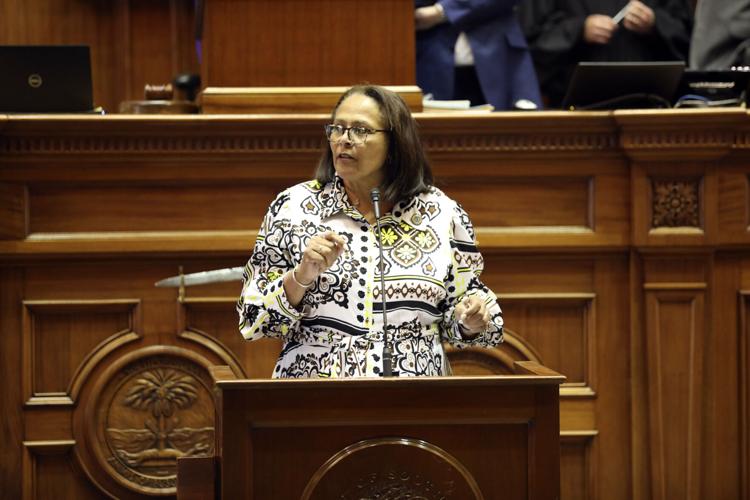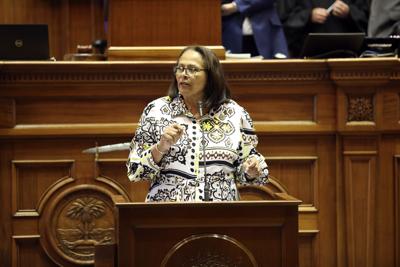COLUMBIA — For three years, a bipartisan group of female state representatives and senators have pushed to lift the state sales tax on women's hygiene products such as tampons and pads.
The state House of Representatives passed the bill unanimously in early April of last year, but with the session winding down a year later, the state Senate, which has six female members, had not touched it.
The Senate, meanwhile, had passed a different tax exemption through the committee process — one for for-profit golf course membership dues.
That bill was sitting on the Senate floor ready for a vote until Sen. Margie Bright Matthews, D-Walterboro, objected to it several weeks ago, using a procedure that allows a single senator to at least temporarily block a piece of legislation.
“To me, it’s a rich man’s tax exemption,” Bright Matthews told The Post and Courier.
Then, in the last few weeks, she and her fellow female senators, nicknamed the “sister senators,” struck a tacit deal with their colleagues to use a parliamentary move to pass the sales tax exemption for period products in exchange for Bright Matthews lifting her objection to the golf tax bill if they did.
“As soon as I objected to the golf tax, everybody was coming to me because they had their rich donors, I imagine, or their buddies who said, ‘We got to get this, we got to get this,’ ” Bright Matthews said. “And that’s when they were … able to act like they were aware we were trying to get the feminine products bill across the line.”
The Senate Finance Committee pulled the period products bill out of committee April 24, allowing it to skip the normal Senate subcommittee and committee process. It went through that process in the House last year.
The Senate then passed the bill unanimously April 30.
A short time later, Bright Matthews lifted her objection to the golf tax exemption, and it passed 40-4. Bright Matthews, who said she still opposes the golf tax exemption, abstained.
“We’re thrilled,” said Sen. Sandy Senn, R-Charleston. “Quite frankly, we think that if we’re going to grant tax exemptions to things like boats and trailers and combines and various tractors, most certainly we should not be taxing something we contend is medically necessary.”

South Carolina Sen. Sandy Senn (right), R-Charleston, and Sen. Penry Gustafson, R-Camden, wait to ask questions April 25, 2023, on the floor of the state Senate.
South Carolina levies a 6 percent sales tax on most products, but there are many exceptions for groceries, many types of medical devices, coal and natural gas for electricity generation, Bibles, newspapers, zoo animals and farm equipment.
Supporters of the bill, sponsored by Orangeburg Democrat Rep. Gilda Cobb-Hunter, said it doesn’t make sense that most medical devices and groceries are exempted, but period products, which women have no choice but to buy, are not.
The bill would reduce state sales tax receipts by $5.9 million and local sales taxes by $1.4 million per year, according to analysis by the state’s Revenue and Fiscal Affairs Office.
The average woman spends $13.25 per month on menstrual products, according to a 2019 poll commissioned by Intimina, a manufacturer of such products.
“By removing the regressive ‘tampon tax,’ South Carolina has taken a major step towards ending period poverty and ensuring menstrual equity for all,” the South Carolina Women’s Rights Empowerment Network said in a statement.
The golf tax bill, sponsored by Daniel Island Republican Rep. Mark Smith, would exempt membership dues paid to for-profit golf clubs from the state’s 5 percent admissions tax. Membership dues for for-profit gyms, pools and racquetball courts are already exempt from the admissions tax, supporters of that bill argued.
“So it’s just this one thing. I don’t think the intent of the law was to do what it did,” Greg Keating, president and CEO of the 36-hole, 1,600 member Daniel Island Club, told The Post and Courier last year.
Golf club members are being taxed twice because they also pay admissions taxes on greens fees, supporters said.
The golf tax bill would reduce admissions tax receipts by about $3 million a year, according to the Revenue and Fiscal Affairs Office.
The golf bill passed the House by a wide margin last year and is also headed to the governor.
Gov. Henry McMaster intends to sign the period products bill and is still reviewing the golf bill, according to spokesman Brandon Charochak.








